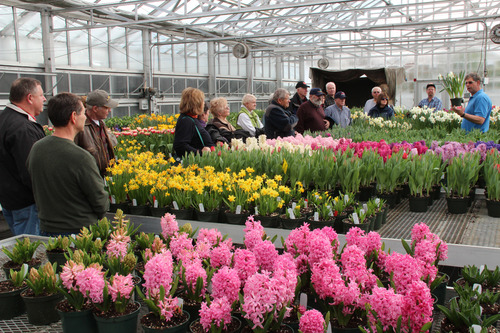
Reposted from CALS Notes:
The Cornell University Agricultural Experiment Station (CUAES) recently hosted over two-dozen farmers and producers from Oregon who visited Cornell as part of an agricultural education tour of New York State. The tour, sponsored by the AgriBuisness Management Program of Chemeketa Community College in Salem, OR, started with an overview of the energy efficient growth chambers in Weill Hall given by Nick Van Eck, growth chamber supervisor.
“Instead of using electric heat and refrigeration,” Van Eck explained, “the temperature of these chambers is regulated by utilizing campus chilled water and hot water that heats the building.”
The tour continued to the greenhouse complex, where Neil Mattson, associate professor of horticulture, showed off spring trials being conducted as part of his research comparing the efficacy of organic vs. conventional fertilizers in the production of bedding plants and vegetable transplants.
“We compared the performance of tomato and pepper seedlings to four different commercially available vermicompost materials. Not all materials are suitable for use as the sole fertility source, but we found excellent performance from Worm Power, a New York state company and one of our grant collaborators.”
Mattson also noted that controlled release fertilizers and slow release organic fertilizers can be an effective way to reduce nutrient leaching to the environment.
Elsewhere in the greenhouses, Bill Miller, professor of horticulture and research director of the Cornell Flower Bulb Research Program, demonstrated how the growth regulator ethephon helps to keep flowering plants like hyacinths and daffodils shorter and stockier so they hold up better during shipping and sale (pictured).
Other presenters included Department of Horticulture faculty members Ken Mudge and Marvin Pritts, CUAES Director of Operations Glenn Evans, and James Tanaka of theCornell Small Grains Breeding Project.


